|
|
|
Sort Order |
|
|
|
Items / Page
|
|
|
|
|
|
|
| Srl | Item |
| 1 |
ID:
124113
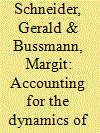

|
|
|
|
|
| Publication |
2013.
|
| Summary/Abstract |
This article presents the Konstanz One-Sided Violence Event Dataset (KOSVED) which allows researchers to study the dynamics of civilian abuse in 17 civil wars. The dataset provides, based on a multitude of sources, detailed information on the number of civilians killed or harmed by government or rebel troops. Where information is available, KOSVED also documents the dates of these events as well as the identities of the perpetrators and the means used in terrorizing the civilian population. The authors argue that the content analysis of news reports offers relatively accurate figures on those events that the perpetrators cannot hide from the public and that receive prominent media attention. Presumably, such information motivates potential short-term retaliatory acts by the group that has been the target of one-sided violence. The analysis suggests that, over the course of a conflict, almost all actors attack unarmed citizens, although to radically different degrees and relying on different means.
|
|
|
|
|
|
|
|
|
|
|
|
|
|
|
|
| 2 |
ID:
095022
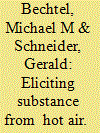

|
|
|
|
|
| Publication |
2010.
|
| Summary/Abstract |
The results of deliberations in multilateral fora are often considered ineffective. Decision making in the European Union (EU) and in particular its key intergovernmental body, the European Council, poses no exception. Especially in the domain of EU foreign and security affairs, the unanimity requirement governing this institution allegedly allows nationalist governments to torpedo any attempt to build up a credible European defense force and a unified foreign policy stance. In this article, we take issue with the claim that multilateral summits merely result in "hot air" by looking at whether and how decisions made during EU summit meetings affect the European defense industry. We argue that investors react positively to a successful strengthening of Europe's military component-a vital part of the intensified cooperation within the European Security and Defense Policy (ESDP)-since such decisions increase the demand for military products and raise the expected profits in the European defense industry. Our findings lend empirical support to the view that financial markets indeed evaluate the substance of European Council meetings and react positively to those summit decisions that consolidate EU military capabilities and the ESDP. Each of the substantial council decisions studied increased the value of the European defense sector by about 4 billion euros on average. This shows that multilateral decisions can have considerable economic and financial repercussions.
|
|
|
|
|
|
|
|
|
|
|
|
|
|
|
|
| 3 |
ID:
006914
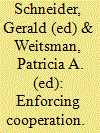

|
|
|
|
|
| Publication |
Houndmills, Macmillan, 1997.
|
| Description |
xv,337p.
|
| Standard Number |
0312162901
|
|
|
|
|
|
|
|
|
|
|
|
Copies: C:1/I:0,R:0,Q:0
Circulation
| Accession# | Call# | Current Location | Status | Policy | Location |
| 038774 | 327.17/SCH 038774 | Main | On Shelf | General | |
|
|
|
|
| 4 |
ID:
095627
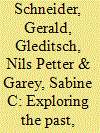

|
|
|
| 5 |
ID:
067216
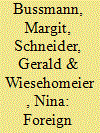

|
|
|
| 6 |
ID:
053839
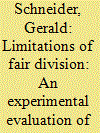

|
|
|
| 7 |
ID:
152300
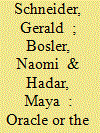

|
|
|
|
|
| Summary/Abstract |
The forecasting literature has come to mistrust the predictions made by experts who forecast political events in mass media. Distinguishing between judgements made by one or few individuals (‘oracles’) and assessments made by larger groups (‘crowds’), we contrast journalistic predictions with forecasts stemming from the financial industry. These two competing views were evaluated in a quantitative analysis of the ex ante success of 24 ceasefire agreements in various conflicts which took place in the Levant from 1993 to 2014. Our analysis compares the forecasts appearing in press commentaries (Haaretz, Jerusalem Post and New York Times) with the expectations that the Tel Aviv Stock Exchange had about the stability of these cooperative efforts. To evaluate the predictions of these very dissimilar sources, the effectiveness of the ceasefires was analysed through the number of violent events following the official start of the truce. The analysis shows that the financial industry performs better than the media industry in the comparative evaluation of ceasefire forecasts, but that neither source provides sufficiently accurate predictions. The partial support for the crowd thesis is discussed in light of recent literature that resuscitates the usage of well-trained experts for forecasting purposes, but warns against the dramatizing predictions of media pundits.
|
|
|
|
|
|
|
|
|
|
|
|
|
|
|
|
| 8 |
ID:
128865
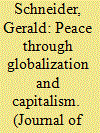

|
|
|
|
|
| Publication |
2014.
|
| Summary/Abstract |
The security externalities of globalization and capitalism continue to play an influential role in peace research. Typical contributions to these interrelated areas of scientific inquiry address the hope that the external openness (commercial liberalism) and the internal freedom of an economy (capitalist peace) pacify interstate as well as intrastate relations. I claim, despite the empirical support both theses have received, that they face considerable analytical hurdles. Commercial liberalism has, on a theoretical level, not yet moved much beyond the opportunity cost arguments that enlightenment philosophers first advanced more than 200 years ago. The capitalist peace research program similarly does not offer clear micro-level mechanisms explaining why the interactions between economic agents and political decisionmakers should be more peaceful in capitalist than in state-dominated economies. Drawing on the political economy literature, I argue that economic liberalism should distinguish between level- and change-effects of both globalization and capitalism and that thinking in analogies between domestic and interstate peace has prevented the field from making analytical headway. Both literatures will only profit from the advent of 'big data' in the case that the field addresses the theoretical challenges upfront.
|
|
|
|
|
|
|
|
|
|
|
|
|
|
|
|
| 9 |
ID:
080981
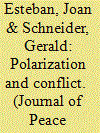

|
|
|
|
|
| Publication |
2008.
|
| Summary/Abstract |
Recent formal and empirical research in political science and economics strongly indicates that various forms of political and social polarization increase the risk of violent conflict within and between nation states. The articles collected for this issue explore this crucial relationship and provide answers to a variety of topics: First, contributors address how institutions and other contingent factors mediate the conflict potential in polarized societies. Second, this special issue compares the explanatory power of income polarization with traditional and new measures of inequality. Third, the contributions examine how groups form and coalitions are built in polarized societies and how this affects political decision-making. Finally, the special issue analyses the interconnections between interstate war, internationalized conflict and polarization. This introduction synthesizes the literatures that have been developed on the issue of polarization and conflict in the various social scientific disciplines. The authors particularly discuss the similarities between economic models of conflict and the so-called crisis bargaining literature which has been mainly developed within political science. The article shows the differences between `polarization' and `inequality' and introduces the various measures of diversity that have been used in the study of interstate and intrastate conflict during the past few decades.
|
|
|
|
|
|
|
|
|
|
|
|
|
|
|
|
| 10 |
ID:
080984
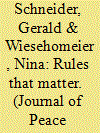

|
|
|
|
|
| Publication |
2008.
|
| Summary/Abstract |
One controversy in the study of civil war relates to the role that institutions play in ethnically diverse societies. `Constitutional engineers' advance various institutional arrangements, ranging from democracy in general to specific constitutional and electoral rules, as those mechanisms that help divided societies to resolve disputes peacefully. Political sociologists, by contrast, maintain that political institutions are largely an epiphenomenon. Synthesizing the two conflicting schools of thought, the authors examine how different institutions in conjunction with three forms of ethnic diversity - fractionalization, dominance and polarization - affect the risk of civil war. It is argued that groups perceive institutions as a constraint and that they consider the usage of political violence if they cannot achieve their goals peacefully. The examination of these conditional institutionalist hypotheses for the period between 1950 and 2000 shows, in accordance with recent theoretical work, that fractionalization can indeed be linked to low-intensity civil wars and that this effect is particularly strong in democracies in comparison to autocracies. Interacting the measures of diversity with different democratic institutions, the authors confirm that rules that encourage power-sharing lower the risk of war in diverse societies. The event-history models, moreover, show that the combination of fractionalization and majoritarian voting forebodes badly for the internal stability of a state. Within the set of democratic regimes studied in this article, presidential systems are the most war-prone institutional setting.
|
|
|
|
|
|
|
|
|
|
|
|
|
|
|
|
| 11 |
ID:
073759
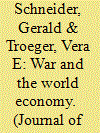

|
|
|
|
|
| Publication |
2006.
|
| Summary/Abstract |
One of the perennial questions in the scientific study of war is how war affects the economy. The authors examine the influence that the political developments within three war regions had on global financial markets (CAC, Dow Jones, FTSE) from 1990 to 2000. They embed a rational expectation framework within commercial liberalism, a theoretical strand that tries to assess the interrelationship between war and economic exchanges. Time-series analyses account for the effects that the conflict between Israel and the Palestinians, the first confrontation of a U.S.-led alliance against Iraq, and the wars fought in Ex-Yugoslavia exerted. Using daily stock market data, the authors show that the conflicts affected the interactions at the core financial markets in the Western world negatively, if they had any systematic influence at all. They argue that these results lend some support to the rational expectations version of commercial liberalism.
|
|
|
|
|
|
|
|
|
|
|
|
|
|
|
|
| 12 |
ID:
076507
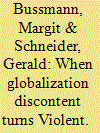

|
|
|
|
|
| Publication |
2007.
|
| Summary/Abstract |
One of the disputed consequences of global economic integration is the possible effect that foreign economic liberalization exerts on social cohesion. Proponents of commercial liberalism see stabilization as an indirect consequence of growing economic interdependence, while globalization critics are much more skeptical. They expect, at least during the liberalization process, destabilizing effects. We examine in this paper the contradictory claims in the light of what we call the distributional theory of civil war. This variant of commercial liberalism qualifies the peace-through-trade hypothesis and expects, based on political economy models of trade policy making, that the redistributive struggle associated with foreign economic liberalization can culminate in violent forms of protest. We demonstrate that a higher level of economic openness is indeed associated with a lower risk of civil war. At the same time, economic liberalization increases the chances of instability weakly. None of the following factors are found to exert any compensatory influence on instability: social spending, foreign aid, and financial flows from the International Monetary Fund. Discontent over the process of globalization is thus a destabilizing force despite the pacifying effect that the level of economic integration exerts.
|
|
|
|
|
|
|
|
|
|
|
|
|
|
|
|
|
|
|
|
|